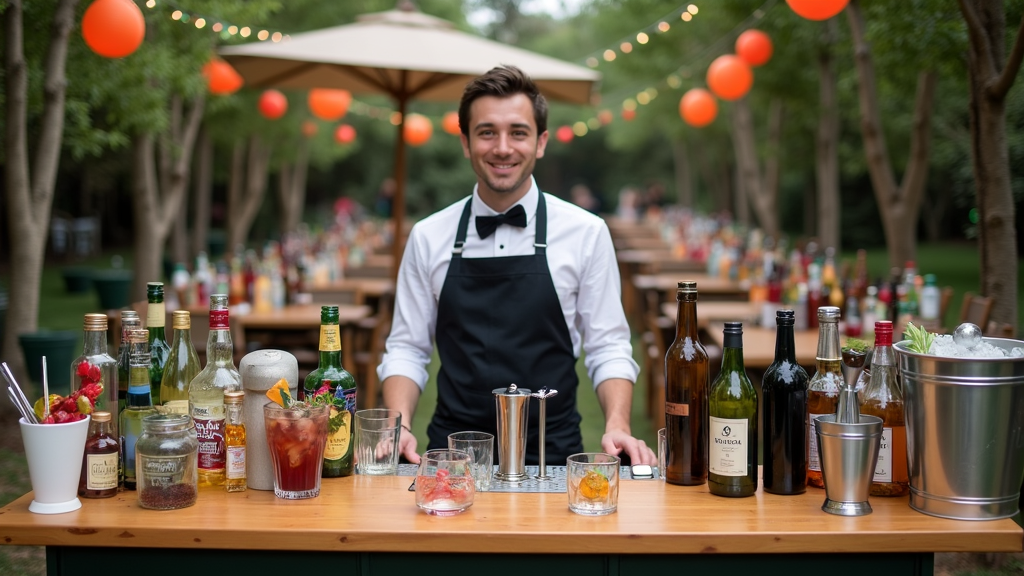Crafting Cocktails: A Guide to Becoming a Bartender
How to Become a Bartender in Australia: Your Complete Guide
I’m your host, KAD, and I’ve been slinging drinks and navigating the world of hospitality for over two decades.
The past 15 years, I’ve perfected my bartending skills, experimented with countless flavor combinations, and learning a thing or two about how to keep the party going behind the bar.
Whether you’re a seasoned bartender like me just looking for some fresh inspiration or a complete beginner who is eager to whip up impressive cocktails at home, Shake, Sip, Serve is here to be your guide.
In the below blog, I’ll be sharing my knowledge and experience on everything from classic cocktails and innovative new creations to essential bartending techniques and industry secrets. I’ll also be offering tips on stocking your home bar, mastering the art of presentation, and creating a memorable experience for your guests.
So, grab your shaker, dust off your favorite glassware, and get ready to embark on a delicious journey into the world of bartending!
Let’s Shake, Sip, and Serve up something amazing together.
Disclaimer: This post contains affiliate links. If you purchase through these links, I may earn a small commission at no additional cost to you.
You are finally 18 and in Australia and are needing to bring in some extra cash as the current Maccas and Woolies wages are just not cutting it?
Now that you have finally reached the legal age in Australia to jump behind a bar, the thought of shaking up cocktails, thriving in a buzzing atmosphere, and meeting people from all walks of life makes bartending one of the most exciting careers in hospitality.
But before you grab a shaker and start muddling mint, let’s explore what it really takes to become a bartender in Australia and how you can turn that dream into reality.
Why Choose Bartending in Australia?
The Australian bar scene is always thriving.
From Sydney’s rooftop cocktail lounges to Melbourne’s laneway bars, there’s no shortage of opportunities when you have the magical RSA card.
When I left school I was completly lost. I didnt know what industry i saw myself in and or what I was going to do now that I had finished school.
I had friends who were in the hospitality industry busting tables and thought obtaining an RSA for a bit of extra cash did not sound like a bad idea.
Once I applied to do the course I found that the fun idea of some extra cash could also open myself up to an interesting career.
Not only does the hospitality industry allow you to work and study it gives you the flexibility of learning a trade that you can take with you on world wide adventures.
How you ask? Well bartending falls into such a wide spread neiche.
I could work in an industry that was;
-
A Creative Outlet – It’s not just about pouring drinks. Bartending lets you experiment with flavours, garnish with flair, and create cocktails that wow.
-
Social and Fun – Love meeting people? You’ll be the face behind the bar, chatting with regulars, tourists, and everyone in between.
-
Diverse Workplaces – Whether it’s pubs, nightclubs, restaurants, or hotels, you can find a setting that matches your vibe.
-
Flexible Hours – Ideal for students or side hustlers, bartending often allows part-time or late-night schedules.
-
Travel Potential – Your skills are transferable across Australia and abroad.
-
Career Growth – Start as a bartender, but the path could lead to bar manager, brand ambassador, or even owning your own venue.
What Does a Bartender Actually Do?
Being a bartender is more than working long hours and being a shoulder for those to lean on.
Here’s what’s expected behind the bar:
-
Mix and Serve Drinks – From classic cocktails to local wines and craft beers. This all does come with experience, You will never know how to do it all.
-
Deliver Great Service – Taking orders, recommending drinks, and making customers feel welcome.
-
Stay Organised – Keeping the bar stocked, clean, and compliant with hygiene standards.
-
Handle Transactions – Processing payments quickly and accurately.
-
Follow RSA Laws – Making sure alcohol is served responsibly, checking IDs, and refusing service when necessary.
Skills You’ll Need:
-
Cocktail knowledge (at least the basics!) – I have a 50 page beginner friendly book available here
-
Strong customer service
-
Ability to multitask and think quick on your feet
-
Stamina for long shifts and lots of standing
-
A calm head under pressure
Legal Requirements: RSA and More
In Australia, you must have a Responsible Service of Alcohol (RSA) certificate before you can work in a licensed venue. This is not optional—it’s the law.
What RSA Training Covers
-
Checking IDs and preventing underage service
-
Spotting signs of intoxication
-
Politely refusing service when required
-
Your legal responsibilities as a server
How to Get Your RSA
-
Training is available online and in person through accredited providers.
-
Each state/territory has its own rules:
-
NSW – stricter, only certain providers are approved by Liquor & Gaming NSW.
-
VIC, QLD, SA, WA, TAS, NT, ACT – RSA courses are accepted but check local regulations.
-
💡 Tip: If you move interstate, you may need to re-do your RSA to meet local requirements.
Other Helpful Certificates
-
Responsible Conduct of Gambling (RCG): Needed if the venue has poker machines.
-
Food Safety Certificate: Useful if your role includes food handling.
-
First Aid: Not required, but many venues prefer it.
Where to Find Bartending Jobs in Australia
Hospitality is one of the country’s largest employers, and bartending jobs are always in demand.
Best places to look:
-
Job boards: Seek, Indeed, Jora.
-
Hospitality-specific platforms: Barcats, Scout, HospoJobs.
-
Networking: Join Facebook groups, talk to bartenders, or connect with managers.
-
Walk-ins: Many venues still hire from resumes handed in directly.
Hotspots for bartending work:
-
Sydney & Melbourne: Known for vibrant cocktail cultures.
-
Brisbane & Gold Coast: Popular with tourists and nightlife seekers.
-
Perth: Growing craft beer and cocktail scene.
-
Regional Australia: Tourist towns (Byron Bay, Cairns, Margaret River) often need seasonal staff.
Writing a Resume That Gets You Hired
Your resume is your foot in the door. Keep it clear and hospitality-focused:
-
Highlight RSA & certifications at the top.
-
Show transferable skills (customer service, cash handling).
-
Add hospitality experience (cafes, restaurants, pubs).
-
Include a short cover letter with a friendly tone that shows enthusiasm.
💡 Even if you’ve never worked behind a bar, employers often hire people with the right attitude and willingness to learn.
Building Your Skills
Before your first shift, brush up on:
-
Classic cocktails – Mojito, Margarita, Espresso Martini, Old Fashioned.
-
Bar tools – shaker, strainer, muddler, jigger.
-
RSA in practice – checking IDs, cutting off service.
Pro tip: Practice free pouring at home with water to build accuracy and speed.
Challenges Bartenders Face
Bartending is fun—but it comes with challenges. Here’s how to handle them:
-
Drunk Customers: Use RSA skills. Stay calm, firm, and prioritise safety.
-
Busy Shifts: Work methodically, stay organised, and communicate with your team.
-
Customer Complaints: Listen, apologise if needed, and resolve the issue professionally.
-
Late Nights & Stress: Prioritise rest, hydration, and balance outside of work.
Career Progression: Where Bartending Can Take You
Bartending can be the start of a long career in hospitality. Possible next steps include:
-
Head Bartender or Bar Manager – running the bar, staff, and stock.
-
Brand Ambassador – representing spirit/wine companies.
-
Hospitality Management – hotel, restaurant, or venue manager roles.
-
Entrepreneurship – starting your own bar, café, or mobile bartending business.
Pay, Tips, and Lifestyle
-
Pay Rates (2025): Casual bartenders usually earn $28–$35 per hour, including penalty rates.
-
Tips: Not mandatory in Australia but can add up, especially in cocktail bars or busy pubs.
-
Lifestyle: Shifts often include nights, weekends, and public holidays—but the flexibility can suit students or those with side hustles.
FAQs About Becoming a Bartender in Australia
1. Do I need experience to get hired?
Not always. Many venues train new staff if you have your RSA and the right attitude.
2. How long does it take to get an RSA?
Usually just 1 day (online or in person), though processing may take a few days.
3. Can I work anywhere in Australia with one RSA?
Not necessarily—some states require their own version (e.g., NSW).
4. Is bartending a good career in Australia?
Yes! With flexible hours, solid pay, and career pathways, it’s a great option for students, travelers, and long-term hospitality pros.
5. Can bartending lead to other jobs?
Definitely. Many managers, venue owners, and hospitality consultants started behind the bar.
Final Cheers
Becoming a bartender in Australia is more than a job it’s a chance to build skills, meet people, and work in a fast-paced, creative industry. With your RSA, enthusiasm, and willingness to learn, you can create a rewarding career behind the bar.
So polish your resume, brush up on cocktail basics, and raise a glass to your bartending journey.
Thanks for joining us behind the bar!
The bartending community is a vibrant and supportive one, and I’m excited to build that community here on Shake, Sip, Serve. I’d love to hear your thoughts, questions, and experiences in the comments below.
What are you shaking up these days?
What topics would you like to see covered in future posts?
Let’s connect and continue the conversation!

Read more:
- Learning To Become A Bartender: The Basics Behind The Bar
- Bartending Education
- Practice pouring accurately
- Memorize recipes: Know classic cocktail recipes by heart and understand how to modify them.
- Develop your palate: Train your taste buds to distinguish different flavors and ingredients.
- Understand alcohol laws: Familiarize yourself with local laws and regulations regarding alcohol service.
- Practice speed and efficiency: Work on your multitasking skills to serve customers quickly during busy shifts.
- Perfect your customer service skills: Hospitality is key in bartending, so focus on providing exceptional service.
- Learn to manage inventory: Understand how to keep track of stock and minimize waste.
- Which Alcoholic Drink Has Least Calories?
- Shaken, Not Stirred: How To Become A Bartender Online 18+
- The Ultimate Guide To The Best Adult Drinking Games 18+
- Uncorking The Truth: How Many Calories Are In Alcohol?
- The Mini Beer Shot For A Novel Experience
- The Three Wise Men Shot For A Bold Adventure
